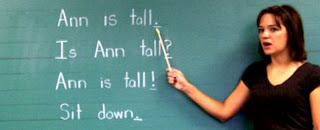It was revealed around a month ago that as of September 2013 the entry tests for teacher training will contain
more difficult questions in English, maths and reasoning. Is this necessary or another way of weeding out potentially excellent teachers?
As a teacher, I obviously spend a lot of time with other teachers. Although I can't comment on teachers in schools, it appears to me that college teachers often are lacking in ability in maths and English. I currently work within a childcare department in the college where I am based, and I do come across resources created by other members of staff. Often these contain poor grammar and spelling, and I wonder how these professionals can be marking work accurately for spelling and grammar when their skills are lacking personally.
On the other hand, these people are evidence that you can be successful, particularly in a vocational field without needing incredibly high maths and English skills, and so are these skills truly important? Personally, as an English and maths teacher, I feel they are to my life, but I obviously have a lot invested in my own abilities in English and maths. However, these other teachers are largely effective teachers with engaging lessons.
These proposed changes may limit they ability of many people to access teacher training. Teaching isn't always about having excellent skills in every area, but being able to promote discussion and engage learners. Of course a teacher is a role model, but in which ways are we supposed to be leading our students?
Is this an attempt by the conservative government in order to create a nation of academic teachers leading us towards an elitist society. Will pronunciation, accent and communication start to become a factor in teacher training?
Are we going to end up employing only teachers who have high intelligence but cannot relate to students?
I am concerned by the reasons why these changes are taking place, and the impact they will have on teaching as a profession. Teachers do want to be viewed as professionals who are skilled in their chosen fields. Yet, being good at 'teaching' should be at the forefront of the profession, rather than academic ability. In fact, in many cases the more intelligent and highly educated a teacher is, the harder they find it to teach low-level students and these students get left behind.
Although it looks like a good idea to employ as highly skilled teachers as possible, this isn't always best for those they are teaching.
What do you think?

No comments:
Post a Comment